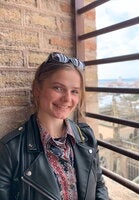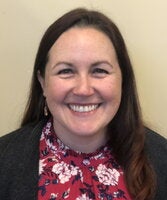
Illinois Global Classrooms is a COIL initiative that supports students and instructors to structure Collaborative, Online, and International Learning experiences, facilitated by technology, between students at the University of Illinois and students from international partner institutions.
In this program, you'll connect with an international partner in a similar or complementary major to develop a virtual project, and you implement it in one of your existing courses. Projects vary in scope and duration but typically last between six and eight weeks.
In collaboration with the campus-wide study abroad community and with support from the European Union Center, Center for East Asian and Pacific Studies, Center for Latin American and Caribbean Studies, and the Center for Global Studies, LAS Global Classrooms will expand your global learning reach, allow you to see your major from multiple perspectives, and will help you challenge your assumptions.
Learn more about how the Global Classroom initiative brings scholars together and fosters transformative learning experiences in this article.
Fall 2025 Course Offerings
BTW 380: Global Business Communication
Instructor: Andrew Moss, Senior Lecturer, Siebel Center for Design Affiliate
Partner: Jaime Bolaños, ITESO, Universidad Jesuita de Guadalajara, México
How do professionals working internationally negotiate, express disagreement, and maintain relationships? How do management strategies, marketing plans, and human resource decisions differ from one country to another? This class answers these questions and many more about culture, business, and writing. With a strong focus on written communication, this course focuses on current trends in international business management and an array of writing skills and activities to prepare students to succeed in international careers.
Prerequisite: Completion of the campus Composition I requirement. Restricted to students with Sophomore, Junior, or Senior class standing.
This course satisfies the General Education Criteria in Fall 2025 for: Advanced Composition.
3 undergraduate hours.
BUS 215: Sophomore Gies Scholar Seminar
Instructor: Rachel Newell, Assistant Director, Gies Honors, Gies College of Business
Required for all Gies Scholar sophomores. The course structure is divided into four focused learning modules: Negotiations, Intercultural Communications, Disruption, and Project Management.. Prerequisite: Second-year student in the Gies Scholar Program.
1 undergraduate hour.
CMN 396: Special Topics in Communication
Instructor: Mardia Bishop, Director of Public Speaking, Assistant Professor, Department of Communication
Partner: Ariadna Levi, Professor, Professor of Interculturality, Department of Human Formation, Iteso, Universidad Jesuita de Guadalajara, Mexico
This is a skills course that emphasizes improving listening skills through continual practice. Students will first practice basic listening components. Then, students will learn how to and practice various types of listening (active, empathetic, etc.), as well as practice listening in various situations (conflict management, mediation, etc.).
3 undergraduate hours.
ECON 415: Environmental Economics
Instructor: Bryan Buckley, Assistant Teaching Professor, Department of Economics
Partners: Liliana Harding, University of East Anglia, UK and Isabel Rodriguez Tejedo, University of Navarra, Spain
Application of economic theory to topical issues such as pollution, climate change, and the environmental impacts of overpopulation. Both market-based and regulatory solutions to these problems are discussed.
3 undergraduate hours. 4 graduate hours. Prerequisite: ECON 202; ECON 302; MATH 220/MATH 221 or other Calculus course.
ENG 177: Engineering First-Year Experience Seminars: Global Community Service-Bolivia
Instructor: Carlos Molina-Vital, Instructor, Center for Latin American and Caribbean Studies
Instructor: Kimberly Powers, Associate Director, Grainger First-Year Experience, Grainger College of Engineering
This course and study abroad program seeks to encourage the development of global and intercultural competencies through critical, constructive, and creative thinking. Through this community service opportunity in Bolivia, students will examine how to effectively work with their classmates and complete a community-driven project with a local NGO or start-up. The course concludes with a service program to Bolivia for 10 days in January. Enrollment in this section does not include travel costs, which must be paid separately. Learn more about estimated costs and travel details here: https://gfx.grainger.illinois.edu/gfx-scholars/global-community-service.
1 undergraduate hour.
ENG 177: Engineering First-Year Experience Seminars: Global Disasters Resilience-Puerto Rico
Instructor: Luis Rodriguez, Associate Professor, Agricultural & Biological Engineering, Grainger College of Engineering
Through case studies, interactive projects, hands-on activities, and a study abroad program, students will learn about the cultural, political, and social factors for specific disaster-prone regions. Students will initiate their training in not only the design of, but also the assessment of the resilience of potential technological solutions when responding to current and anticipated challenges for regions under consideration. Students will work with local communities, aid organizations, and peer institutions in the identification and implementation of sustainable responses. The program travels one week in January. Enrollment in this section does not include travel costs, which must be paid separately. Learn more about estimated costs and travel details here: https://gfx.grainger.illinois.edu/gfx-scholars/global-disaster-resilien…
1 undergraduate hour.
ENG 177: Engineering First-Year Experience Seminars: Global Food Sustainability
Instructor: Joan Brown, Associate Director, Grainger First-Year Experience, Grainger College of Engineering
In this course, students will learn how cultural, social, environmental, and economic factors impact food sustainability from production through waste reduction. The course concludes with a service program to Ecuador for 10 days in January. Enrollment in this section does not include travel costs, which must be paid separately. Learn more about estimated costs and travel details here: https://gfx.grainger.illinois.edu/gfx-scholars/global-food-sustainabili….
1 undergraduate hour.
ENG 177: Engineering First-Year Experience Seminars: Global Sustainability-T&T
Instructor: Gretchen Forman, Associate Director, Grainger First-Year Experience, Grainger College of Engineering
In this course, students will learn about issues related to sustainability and sustainable practices, both in engineering and in their personal lives. Travel to Trinidad & Tobago will take place at the end of the course to interact with locals through service-learning projects initiated in class during the fall semester. Travel will last 9 days in January 2026. Enrollment in this section does not include travel costs, which must be paid separately. Learn more about estimated costs and travel details here: https://gfx.grainger.illinois.edu/gfx-scholars/global-sustainability.
1 undergraduate hour.
QUEC 410: Beginning Quechua
Instructor: Carlos Molina-Vital, Instructor, Center for Latin American and Caribbean Studies
Partners: Gavina Cordova and Luis Mujica, Universidad Nacional Jose Maria Arguedas, Peru
Upon the consent of the Director of the Center for Latin American and Caribbean Studies, tutorials are available in special native Latin American languages not regularly offered by the University (ie. Quechua, Kagchikel Mayan). Tutorials at the elementary, intermediate, and advanced levels may be arranged. Students registering for unit credit for the first two terms must first present satisfactory evidence of knowledge of the language at the elementary level, either in the form of credit earned at another institution or by passing a proficiency examination.
SAME 250: Introduction to Middle East Studies
Instructor: Marc Abou Abdallah, Visiting Assistant Professor, Department of Classics
Partners: Amideast Yemen, Qisana ("our stories")
Introduction to the study of the region known as the "Middle East." Students will gain an appreciation of the variety of cultures, ethnicities, and religious traditions in the region, as well as how recent history has changed long standing norms, and the resulting challenges.
UP 160: Race, Social Justice, and Cities
Instructor: Ken Salo, Assistant Clinical Professor, Department of Urban and Regional Planning, College of Fine & Applied Arts
Partners: Ricardo Nascimento, UNILAB, Brazil and Greg Ruiters, University of the Western Cape, South Africa
Study of the history and politics of American cities as sites of everyday struggles against systemic racialized exclusions rooted in patterns of residential segregation. Frame everyday racial encounters as surface symptoms of submerged and systematic forms of racism rooted in centuries of genocide, land theft, racial slavery, and decades of Jim Crow segregation and neoliberal exclusions. Explore everyday racial conflicts in selected cities as expressions of historical struggles for social and spatial justice, across multiple scales. Focus on the governance of routine social practices ranging from policing, to education, to gentrification and memorialization in public places. Final student projects will focus on social struggles against systemic and everyday racisms in a self-selected city of their choice.
This course satisfies the General Education Criteria in Fall 2025 for Cultural Studies - US Minority.
UP 260: Social Inequality and Planning
Instructor: Ken Salo, Clinical Assistant Professor, Department of Urban and Regional Planning, College of Fine & Applied Arts
Partners: Ricardo Nascimento, UNILAB, Brazil, and Greg Ruiters, University of the Western Cape, South Africa
How are inequalities produced and contested in an urban environment? This course examines this question by analyzing how the urban landscape shapes and is shaped by race, class, and gender inequalities. Uses comparative cases to explore successful intervention, both from formal and informal, across multiple scales from the local to the global.
This course satisfies the General Education Criteria in Fall 2025 for: Social & Beh Sci - Soc Sci
Spring 2025
ABE 232: Context in International Interventions
Instructor: Ann-Perry Witmer, Senior Research Scientist
Partner: Universidad Privada Boliviana, La Paz, Bolivia
This multi-disciplinary course will examine a new approach to infrastructure engineering for alternately developed societies that seeks to counteract the disconnects and differing objectives among project stakeholders that result in lack of infrastructure sustainability and resiliency. Using a case study from Western Africa, the course will consider the impact of globalization, the attitudes of industrialized societies, and the role of place-based knowledge in designing and implementing infrastructure interventions for rural societies.
3 undergraduate hours.
ACE 398: Recreation, Sport and Tourism Economics in Croatia
Instructor: Renata Endres, Associate Professor, College of Applied Health Sciences
Experiential learning on a special topic in a field of study directly pertaining to subject matter in agricultural and consumer economics.
ACE 436: International Business Immersion
Instructor: Meredith Blumthal, Associate Professor, Director of Food & Agribusiness Management Program, College of Agricultural, Consumer and Environmental Economics
Instructor: Chaya S. Sandler, Academic Advisor and Experiential Learning Coordinator, College of Agricultural, Consumer and Environmental Economics
This is an experiential learning course with an international travel component designed to equip participants with the skills required to successfully operate in a global business environment. Examples of topics covered include global supply chains and marketing channels, regulatory and trade environments, and environmental considerations.
ANTH 485: Anthropology of Policing
Instructor: Jeffrey T. Martin, Associate Professor, Department of Anthropology
Partner: Lingxiao Zhou, Professor, Zhejiang University of Finance and Economics, Hangzhou, CN
Introduction to the use of anthropological theories and methods in policing studies. Includes comparative historical survey of the diverse sources of power and authority which are bundled into the modern idea of "police power," considers the range of authors contributing to contemporary debates about policing in anthropology, and supports students focusing on both theoretical and applied questions.
3 undergraduate hours. 4 graduate hours.
BADM 395: International Business Immersion
Instructor: Gretchen Winter, Clinical Assistant Professor of Business Administration, Associate Professor, Gies College of Business
This Global Classroom/Study Abroad offering will challenge students to think about how companies can develop a broad plan to transition a country’s energy mix and infrastructure to support a lower carbon future in a professionally responsible manner that balances competing stakeholder interests. The course will include a blend of classroom learning, field trips to area fossil fuel as well as clean energy sites, and guest lectures from business leaders and professors with relevant expertise. Throughout the semester, the Illinois learners enrolled in this course will work in teams that will include students from international universities. The course will feature in-person as well as virtual learning formats to facilitate teamwork. An international site visit will be conducted at the end of the semester. The course will culminate with team presentations to a panel that includes company managers, faculty, and local leaders who will evaluate the professional responsibility, practicality, economic viability, and effectiveness of the plans.
BUS 116: Intercultural Learning in Business
Instructor: Cory Ohms, Assistant Dean for Undergraduate Academic Programs, Gies College of Business
Instructor: Rachel Newell, Assistant Director of Gies Honors, Gies College of Business
Introduction to global learning in business to prepare undergraduate Gies Scholar students to become global business leaders. Restricted to first-year students in the Gies Scholars Program, a leadership program for selected students in the Gies College of Business. Students will work with teams from global universities to solve business problems and when possible, will participate in a short-term study abroad immersion trip.
BUS 199: Technology & Mgmt Business Abroad
Instructor: Samantha Koon, Director Hoeft Technology & Management, Gies College of Business
Introduces T&M students to the history, culture, and business environment of international destinations. Students will engage in company visits, lectures, and experiential learning opportunities to learn more about a variety of businesses abroad, from large corporations to NGOs to startups.
BUS 301: Business in Action
Instructor: James Noonan, Clinical Assistant Professor and Academic Director of the Master’s of Science in Technology Mgmt Program, Gies College of Business
Introduces students to the complexities of business by working on a real organizational problem with an actual client. Students will work with a client to identify, analyze, and present recommendations to solve an organizational problem. Requires students to apply problem-solving skills to uncertain situations as well as build and manage a professional team.
CMN 361: Storytelling as Oral Communication
Instructor: Mardia Bishop, Professor, Director of Public Speaking Instruction, Department of Communication
Partner: Ariadna Levi, Professor, Professor of Interculturality, Department of Human Formation, Iteso, Universidad Jesuita de Guadalajara, Mexico
Explores the role of traditional oral narrative in contemporary social life. Examines some major genres: folktales, family stories, personal growth narratives, professional autobiographical presentations, TED talks. Each of these genres will be examined in terms of content, context in a larger community of discourse, and performance demands. In addition, students will create and perform their own stories representing these genres.
3 undergraduate hours.
ECON 415: Environmental Economics
Instructor: Bryan Buckley, Assistant Teaching Professor, Department of Economics
Partners: Liliana Harding, University of East Anglia, UK and Isabel Rodriguez Tejedo, University of Navarra, Spain
Application of economic theory to topical issues such as pollution, climate change, and the environmental impacts of overpopulation. Both market-based and regulatory solutions to these problems are discussed.
3 undergraduate hours. 4 graduate hours. Prerequisite: ECON 202; ECON 302; MATH 220/MATH 221 or other Calculus course.
EPOL 202: Foundations of Education (ACP)
Instructor: Curtis Mason, Associate Dean for Undergraduate Programs, College of Education
Partner: collaborating with an institution in Ecuador
This course studies some of the problems of formulating and justifying aims and policies in American education, of designing and systematizing the curriculum, of organization and social context of the public school system, and of the teaching-learning process; examined in terms of perspectives provided by social philosophy, history, sociology, and philosophy of education. Completion of campus Composition I general education required for enrollment.
This course satisfies the General Education Criteria in Spring 2025 for: Advanced Composition.
3 undergraduate hours.
LAST 445-1 / QUEC 410: Beginning Quechua
Instructor: Carlos Molina-Vital, Instructor, Center for Latin American and Caribbean Studies
Partners: Gavina Cordova and Luis Mujica, Universidad Nacional Jose Maria Arguedas, Peru
Upon the consent of the Director of the Center for Latin American and Caribbean Studies, tutorials are available in special native Latin American languages not regularly offered by the University (ie. Quechua, Kagchikel Mayan). Tutorials at the elementary, intermediate, and advanced levels may be arranged. Students registering for unit credit for the first two terms must first present satisfactory evidence of knowledge of the language at the elementary level, either in the form of credit earned at another institution or by passing a proficiency examination.
PSYC 144: Stereotypes, Prejudice & Discrimination
Instructor: Chadly Stern, Associate Professor, Department of Psychology
Partner: Jolanta Ambrosewicz-Jacobs, Tacik Przemysław and Karolina Czerska-Shaw, Poland
Exploration of the issues and methods necessary to understand and conduct research into stereotyping, prejudice, and discrimination. To achieve this goal, the course will be broken up into three sections. In the first section, students will be introduced to the basic methods of how behavioral scientists develop research questions, conduct studies, reach conclusions about their findings, and ultimately generalize their findings to understand human behavior. In the second section, students will read about and discuss research examining stereotyping, prejudice, and discrimination, and how these factors contribute to inequality. In the final section, students will learn about research that translates basic findings from behavioral science to understand real-world consequences of stereotyping, prejudice, and inequality. Throughout the course, students will have opportunities to experience the inner workings of the behavioral science research process through touring UIUC behavioral science laboratories, completing and discussing measures of stereotyping and bias employed in the behavioral sciences, and designing and proposing their own empirical studies that would address questions related to inequality.
3 undergraduate hours.
Fall 2024
BTW 280: Global Business Communication
Instructor: Andrew Moss, Senior Lecturer, Siebel Center for Design Affiliate
Partner: Jaime Bolaños, ITESO, Universidad Jesuita de Guadalajara, México
How do professionals working internationally negotiate, express disagreement, and maintain relationships? How do management strategies, marketing plans, and human resource decisions differ from one country to another? This class answers these questions and many more about culture, business, and writing. With a strong focus on written communication, this course focuses on current trends in international business management and an array of writing skills and activities to prepare students to succeed in international careers.
Prerequisite: Completion of the campus Composition I requirement. Restricted to students with Sophomore, Junior, or Senior class standing.
This course satisfies the General Education Criteria in Fall 2024 for: Advanced Composition
CHEM 104: General Chemistry II (Honors)
Instructor: Jose Andino Martinez, Senior Lecturer, Department of Chemistry
Partner: Marlene Emparatriz Acosta Martinez, University of El Salvador
Lecture and discussions. Chemistry of materials, including organic and biological substances, chemical energetics and equilibrium, chemical kinetics, and electrochemistry.
Please contact instructor Jose Andino Martinez for more information about the Global Classrooms section of this course.
This course satisfies the General Education Criteria in Fall 2024 for Nat Sci & Tech - Phys Sciences.
ECON 415: Environmental Economics
Instructor: Bryan Buckley, Assistant Teaching Professor, Department of Economics
Partners: Liliana Harding, University of East Anglia, UK and Isabel Rodriguez Tejedo, University of Navarra, Spain
Application of economic theory to topical issues such as pollution, climate change, and the environmental impacts of overpopulation. Both market-based and regulatory solutions to these problems are discussed.
3 undergraduate hours. 4 graduate hours. Prerequisite: ECON 202; ECON 302; MATH 220/MATH 221 or other Calculus course.
IB 104: Animal Biology
Instructor: Lily Arias, Director, Integrative Biology Merit Workshop Program
Partners: Cesar Aguilar, Universidad Nacional Mayor de San Marcos, Peru
Introductory zoological concepts with emphasis on the diversity and comparative anatomy of animals and the fundamentals of physiology, genetics, evolution, and behavior. Lecture and laboratory.
Students must register for one lab and one lecture section.
This course satisfies the General Education Criteria in Fall 2024 for: Nat Sci & Tech - Life Sciences
LAST 445-1 / QUEC 410: Beginning Quechua
Instructor: Carlos Molina-Vital, Instructor, Center for Latin American and Caribbean Studies
Partners: Gavina Cordova and Luis Mujica, Universidad Nacional Jose Maria Arguedas, Peru
Upon the consent of the Director of the Center for Latin American and Caribbean Studies, tutorials are available in special native Latin American languages not regularly offered by the University (ie. Quechua, Kagchikel Mayan). Tutorials at the elementary, intermediate, and advanced levels may be arranged. Students registering for unit credit for the first two terms must first present satisfactory evidence of knowledge of the language at the elementary level, either in the form of credit earned at another institution or by passing a proficiency examination.
UP 160: Race, Social Justice, and Cities
Instructor: Ken Salo, Assistant Clinical Professor, Department of Urban and Regional Planning
Partners: Ricardo Nascimento, UNILAB, Brazil and Greg Ruiters, University of the Western Cape, South Africa
Study of the history and politics of American cities as sites of everyday struggles against systemic racialized exclusions rooted in patterns of residential segregation. Frame everyday racial encounters as surface symptoms of submerged and systematic forms of racism rooted in centuries of genocide, land theft, racial slavery, and decades of Jim Crow segregation and neoliberal exclusions. Explore everyday racial conflicts in selected cities as expressions of historical struggles for social and spatial justice, across multiple scales. Focus on the governance of routine social practices ranging from policing, to education, to gentrification and memorialization in public places. Final student projects will focus on social struggles against systemic and everyday racisms in a self-selected city of their choice.
This course satisfies the General Education Criteria in Fall 2024 for Cultural Studies - US Minority.
UP 260: Social Inequality and Planning
Instructor: Ken Salo, Clinical Assistant Professor, Department of Urban and Regional Planning
Partners: Ricardo Nascimento, UNILAB, Brazil, and Greg Ruiters, University of the Western Cape, South Africa
How are inequalities produced and contested in an urban environment? This course examines this question by analyzing how the urban landscape shapes and is shaped by race, class, and gender inequalities. Uses comparative cases to explore successful intervention, both from formal and informal, across multiple scales from the local to the global.
This course satisfies the General Education Criteria in Fall 2024 for: Social & Beh Sci - Soc Sci
Spring 2024
ABE 232: Context in International Interventions
Instructor: Ann-Perry Witmer, Senior Research Scientist
Partner: Tommy Pozo Vila, Universidad Privada Boliviana, Bolivia
This multi-disciplinary course will examine a new approach to infrastructure engineering for alternately developed societies that seeks to counteract the disconnects and differing objectives among project stakeholders that result in lack of infrastructure sustainability and resiliency. Using a case study from Western Africa, the course will consider the impact of globalization, the attitudes of industrialized societies, and the role of place-based knowledge in designing and implementing infrastructure interventions for rural societies.
This course satisfies the General Education Criteria in Fall 2023 for Cultural Studies - Non-West, Social & Beh Sci - Soc Sci.
ABE 498: Special Topics (Section JAG)
Instructor: Jorge Alberto Guzman Jaimes, Research Assistant Professor, Department of Agricultural and Biological Engineering
Partner: Navneet Kumar, University of Bonn, Germany, and Carlos Rogerio de Mello, Federal University of Lavras, Brazil
Subject offerings of new and developing areas of knowledge in agricultural and biological engineering intended to augment the existing curriculum.
ACE 436: International Business Immersion
Instructor: Meredith Blumthal, Director & Instructor, Food and Agribusiness Management Program, Department of Agricultural and Consumer Economics
Partners: Universidad de Veracruzana and Campus B, ESALQ
This is an experiential learning course with an international travel component designed to equip participants with the skills required to successfully operate in a global business environment. Examples of topics covered include global supply chains and marketing channels, regulatory and trade environments, and environmental considerations. The course culminates in a two-week immersion in which students learn from business leaders, trade organizations, government officials, and producers in the host country.
CHEM 104: General Chemistry II (Honors)
Instructor: Jose Andino Martinez, Senior Lecturer, Department of Chemistry
Partner: Marlene Emparatriz Acosta Martinez, University of El Salvador
Lecture and discussions. Chemistry of materials, including organic and biological substances, chemical energetics and equilibrium, chemical kinetics, and electrochemistry.
Please contact instructor Jose Andino Martinez for more information about the Global Classrooms section of this course.
This course satisfies the General Education Criteria in Fall 2023 for Nat Sci & Tech - Phys Sciences.
ESE 466: Environmental Policy
Instructor: Warren Lavey, Adjunct Professor, College of Law / Department of Earth, Society, & Environment
Partners: Kateryna Nesterova, International Humanitarian University, Odessa, Ukraine; Rosanna Steininger and Bernhard Löffler, Vienna University, Austria.
Examination of the geographical and political aspects of human-environmental relations; focusing on how environmental problems are defined, negotiated, and addressed through policy formulation. Specific approaches to environmental policy will be considered at different geographical scales.
This course satisfies the General Education Criteria for Advanced Composition.
Fall 2023
ABE 232: Context in International Interventions
Instructor: Ann-Perry Witmer, Senior Research Scientist
Partner: Tommy Pozo Vila, Universidad Privada Boliviana, Bolivia
This multi-disciplinary course will examine a new approach to infrastructure engineering for alternately developed societies that seeks to counteract the disconnects and differing objectives among project stakeholders that result in lack of infrastructure sustainability and resiliency. Using a case study from Western Africa, the course will consider the impact of globalization, the attitudes of industrialized societies, and the role of place-based knowledge in designing and implementing infrastructure interventions for rural societies.
This course satisfies the General Education Criteria in Fall 2023 for Cultural Studies - Non-West, Social & Beh Sci - Soc Sci.
ABE 498: Special Topics (Section JAG)
Instructor: Jorge Alberto Guzman Jaimes, Research Assistant Professor, Department of Agricultural and Biological Engineering
Partner: Navneet Kumar, University of Bonn, Germany, and Carlos Rogerio de Mello, Federal University of Lavras, Brazil
Subject offerings of new and developing areas of knowledge in agricultural and biological engineering intended to augment the existing curriculum.
CHEM 104: General Chemistry II (Honors)
Instructor: Jose Andino Martinez, Senior Lecturer, Department of Chemistry
Partner: Marlene Emparatriz Acosta Martinez, University of El Salvador
Lecture and discussions. Chemistry of materials, including organic and biological substances, chemical energetics and equilibrium, chemical kinetics, and electrochemistry.
Please contact instructor Jose Andino Martinez for more information about the Global Classrooms section of this course.
This course satisfies the General Education Criteria in Fall 2023 for Nat Sci & Tech - Phys Sciences.
ECON 415: Environmental Economics
Instructor: Bryan Buckley, Assistant Teaching Professor, Department of Economics
Partners: Cesar Aguilar, Universidad Nacional Mayor de San Marcos, Peru
Application of economic theory to topical issues such as pollution, climate change, and the environmental impacts of overpopulation. Both market-based and regulatory solutions to these problems are discussed.
IB 104: Animal Biology
Instructor: Lily Arias, Director, Integrative Biology Merit Workshop Program
Partners: Liliana Harding, University of East Anglia, UK, and Isabel Rodriguez Tejedo, University of Navarra, Spain
Introductory zoological concepts with emphasis on the diversity and comparative anatomy of animals and the fundamentals of physiology, genetics, evolution, and behavior. Lecture and laboratory.
This course satisfies the General Education Criteria in Fall 2023 for Nat Sci & Tech - Life Sciences.
LAST 445-1 / QUEC 410: Beginning Quechua
Instructor: Carlos Molina-Vital, Instructor, Center for Latin American and Caribbean Studies
Partners: Gavina Cordova and Luis Mujica, Universidad Nacional Jose Maria Arguedas, Peru
Upon the consent of the Director of the Center for Latin American and Caribbean Studies, tutorials are available in special native Latin American languages not regularly offered by the University (ie. Quechua, Kagchikel Mayan). Tutorials at the elementary, intermediate, and advanced levels may be arranged. Students registering for unit credit for the first two terms must first present satisfactory evidence of knowledge of the language at the elementary level, either in the form of credit earned at another institution or by passing a proficiency examination.
UP 160: Race, Social Justice, and Cities
Instructor: Ken Salo, Assistant Clinical Professor, Department of Urban and Regional Planning
Partners: Ricardo Nascimento, UNILAB, Brazil and Greg Ruiters, University of the Western Cape, South Africa
Study of the history and politics of American cities as sites of everyday struggles against systemic racialized exclusions rooted in patterns of residential segregation. Frame everyday racial encounters as surface symptoms of submerged and systematic forms of racism rooted in centuries of genocide, land theft, racial slavery, and decades of Jim Crow segregation and neoliberal exclusions. Explore everyday racial conflicts in selected cities as expressions of historical struggles for social and spatial justice, across multiple scales. Focus on the governance of routine social practices ranging from policing, to education, to gentrification and memorialization in public places. Final student projects will focus on social struggles against systemic and everyday racisms in a self-selected city of their choice.
This course satisfies the General Education Criteria in Fall 2023 for Cultural Studies - US Minority.
UP 260: Social Inequality and Planning
Instructor: Ken Salo, Clinical Assistant Professor, Department of Urban and Regional Planning
Partners: Ricardo Nascimento, UNILAB, Brazil, and Greg Ruiters, University of the Western Cape, South Africa
How are inequalities produced and contested in an urban environment? This course examines this question by analyzing how the urban landscape shapes and is shaped by race, class, and gender inequalities. The course uses comparative cases to explore successful intervention, both formal and informal, across multiple scales from the local to the global.
This course satisfies the General Education Criteria in Fall 2023 for Social & Beh Sci - Soc Sci.
Summer 2023
ANSC 499: Bovine Assisted Reproductive Technologies
Instructors: Crystal C. Allen, Visiting Research Specialist in Agriculture and Lecturer, and Matthew B. Wheeler, Professor, Department of Animal Sciences
Partner: Isaac P. Kashoma, Sokoine University of Agriculture, Tanzania
Class will meet May 15-June 30 with 1-hour weekly virtual discussion. This is a 2-credit hour course with both asynchronous and synchronous online components. Students will complete asynchronous lecture content in addition to a synchronous online meeting once per week at the scheduled time. Reproductive technology and techniques utilized in cattle including Bos taurus and Bos indicus. Topics include general bovine reproductive anatomy and physiology, estrus detection, estrous cycle control, estrus synchronization, pregnancy diagnosis, nutrition and disease concerns, collecting eggs and sperm, semen processing, in vitro and in vivo embryo production, and emerging assisted reproductive technologies such as AI, IVF, MOET.
UP 160: Race, Social Justice, and Cities
Instructor: Ken Salo, Assistant Clinical Professor, Department of Urban and Regional Planning
Partners: Ricardo Nascimento, UNILAB, Brazil, and Greg Ruiters, University of the Western Cape, South Africa
Study of the history and politics of American cities as sites of everyday struggles against systemic racialized exclusions rooted in patterns of residential segregation. Frame everyday racial encounters as surface symptoms of submerged and systematic forms of racism rooted in centuries of genocide, land theft, racial slavery, and decades of Jim Crow segregation and neoliberal exclusions. Explore everyday racial conflicts in selected cities as expressions of historical struggles for social and spatial justice, across multiple scales. Focus on the governance of routine social practices ranging from policing to education, to gentrification and memorialization in public places. Final student projects will focus on social struggles against systemic and everyday racisms in a self-selected city of their choice.
This course satisfies the General Education Criteria in Summer 2023 for: Cultural Studies - US Minority.
Spring 2023
ABE 232: Context in International Interventions
Instructor: Ann-Perry Witmer, Senior Research Scientist
Partner: Tommy Pozo Vila, Universidad Privada Boliviana, Bolivia
This multi-disciplinary course will examine a new approach to infrastructure engineering for alternately developed societies that seeks to counteract the disconnects and differing objectives among project stakeholders that result in lack of infrastructure sustainability and resiliency. Using a case study from Western Africa, the course will consider the impact of globalization, the attitudes of industrialized societies, and the role of place-based knowledge in designing and implementing infrastructure interventions for rural societies.
This course satisfies the General Education Criteria in Spring 2023 for Cultural Studies - Non-West, Social & Beh Sci - Soc Sci.
CHEM 104: General Chemistry II (Honors)
Instructor: Jose Andino Martinez, Senior Lecturer, Department of Chemistry
Partner: Marlene Emparatriz Acosta Martinez, University of El Salvador
Lecture and discussions. Chemistry of materials, including organic and biological substances, chemical energetics and equilibrium, chemical kinetics, and electrochemistry.
Please contact instructor Jose Andino Martinez for more information about the Global Classrooms section of this course.
This course satisfies the General Education Criteria in Spring 2023 for Nat Sci & Tech - Phys Sciences.
HDFS 398: Child Health in South Africa (Section JB)
Instructor: Jan Brooks, Senior Instructor, Department of Human Development & Family Studies
Partner: Jawaya Shea, University of the Western Cape, South Africa
Guided Course + Remote Internship. This course offers a unique exploration of child development, health perspectives, and challenges in South Africa, focusing on topics such as family, cultural and societal contexts, child guidance, food security, HIV, and tuberculosis care in childhood and adolescence, as well as the effect of COVID-19 on child-being in communities already affected by socio-economic and health disparities. Teams of students from Illinois will partner with peers from South Africa to design developmentally and contextually appropriate programming for selected pediatric and youth projects in the Cape Town area. Interactions with lectures and experts from Illinois and South Africa, as well as agency supervisors, will guide student teams in critical thinking, ethics, and cross-cultural collaboration as they develop a project, curriculum guide, education contribution, or support mechanism for their assigned agency. Additional arranged collaborative time with your internship team will be required.
UP 160: Race, Social Justice, and Cities
Instructor: Ken Salo, Assistant Clinical Professor, Department of Urban and Regional Planning
Partners: Ricardo Nascimento, UNILAB, Brazil and Greg Ruiters, University of the Western Cape, South Africa
Study of the history and politics of American cities as sites of everyday struggles against systemic racialized exclusions rooted in patterns of residential segregation. Frame everyday racial encounters as surface symptoms of submerged and systematic forms of racism rooted in centuries of genocide, land theft, racial slavery, and decades of Jim Crow segregation and neoliberal exclusions. Explore everyday racial conflicts in selected cities as expressions of historical struggles for social and spatial justice, across multiple scales. Focus on the governance of routine social practices ranging from policing, to education, to gentrification and memorialization in public places. Final student projects will focus on social struggles against systemic and everyday racisms in a self-selected city of their choice.
This course satisfies the General Education Criteria in Spring 2023 for Cultural Studies - US Minority.
UP 260: Social Inequality and Planning
Instructor: Ken Salo, Clinical Assistant Professor, Department of Urban and Regional Planning
Partners: Ricardo Nascimento, UNILAB, Brazil, and Greg Ruiters, University of the Western Cape, South Africa
How are inequalities produced and contested in an urban environment? This course examines this question by analyzing how the urban landscape shapes and is shaped by race, class, and gender inequalities. The course uses comparative cases to explore successful intervention, both formal and informal, across multiple scales from the local to the global.
This course satisfies the General Education Criteria in Spring 2023 for Social & Beh Sci - Soc Sci.
Fall 2022
CHEM 104: General Chemistry II
Instructor: Jose Andino Martinez, Senior Lecturer, Department of Chemistry
Partner: Marlene Emparatriz Acosta Martinez, University of El Salvador
Lecture and discussions. Chemistry of materials, including organic and biological substances, chemical energetics and equilibrium, chemical kinetics, and electrochemistry. Please contact instructor Jose Andino Martinez for more information about the Global Classrooms section of this course.
ECON 415: Environmental Economics
Instructor: Bryan Buckley, Assistant Teaching Professor, Department of Economics
Partners: Liliana Harding, University of East Anglia, UK, and Isabel Rodriguez Tejedo, University of Navarra, Spain
Application of economic theory to topical issues such as pollution, climate change, and the environmental impacts of overpopulation. Both market-based and regulatory solutions to these problems are discussed.
IS 390: Consulting for Information Professionals
Instructor: Yoo-Seong Song, Associate Professor, School of Information Sciences
Partner: Sung-Chul Bae, Ulsan National Institute of Science and Technology, South Korea
This course is designed to provide practical and hands-on training by simulating consulting projects. Students will develop proficiencies in problem-solving, team management, storytelling, and professional communications. As they learn the theories and practices of consulting engagements, students will have opportunities to discover how their knowledge in information sciences can be applied to various types of consulting services. The transferrable skills acquired in this class are applicable to other workplace settings.
LAST 445-1 / QUEC 410: Beginning Quechua
Instructor: Carlos Molina-Vital, Instructor, Center for Latin American and Caribbean Studies
Partners: Gavina Cordova and Luis Mujica, Universidad Nacional Jose Maria Arguedas, Peru
Upon the consent of the Director of the Center for Latin American and Caribbean Studies, tutorials are available in special native Latin American languages not regularly offered by the University (ie. Quechua, Kagchikel Mayan). Tutorials at the elementary, intermediate, and advanced levels may be arranged. Students registering for unit credit for the first two terms must first present satisfactory evidence of knowledge of the language at the elementary level, either in the form of credit earned at another institution or by passing a proficiency examination.
UP 160: Race, Social Justice, and Cities
Instructor: Ken Salo, Clinical Assistant Professor, Department of Urban and Regional Planning
Partners: Ricardo Nascimento, UNILAB, Brazil and Greg Ruiters, University of the Western Cape, South Africa
Study of the history and politics of American cities as sites of everyday struggles against systemic racialized exclusions rooted in patterns of residential segregation. Frame everyday racial encounters as surface symptoms of submerged and systematic forms of racism rooted in centuries of genocide, land theft, racial slavery and decades of Jim Crow segregation and neoliberal exclusions. Explore everyday racial conflicts in selected cities as expressions of historical struggles for social and spatial justice, across multiple scales. Focus on the governance of routine social practices ranging from policing, to education, to gentrification and memorialization in public places. Final student projects will focus on social struggles against systemic and everyday racisms in a self-selected city of their choice.
UP 260: Social Inequality and Planning
Instructor: Ken Salo, Clinical Assistant Professor, Department of Urban and Regional Planning
Partners: Ricardo Nascimento, UNILAB, Brazil and Greg Ruiters, University of the Western Cape, South Africa
How are inequalities produced and contested in an urban environment? This course examines this question by analyzing how the urban landscape shapes and is shaped by race, class, and gender inequalities. Uses comparative cases to explore successful intervention, both from formal and informal, across multiple scales from the local to the global.
Spring 2022
ABE 498: Special Topics (Section JAG)
Instructor: Jorge Alberto Guzman Jaimes, Research Assistant Professor, Department of Agricultural and Biological Engineering
Partner: Navneet Kumar, University of Bonn, Germany, and Carlos Rogerio de Mello, Federal University of Lavras, Brazil
Subject offerings of new and developing areas of knowledge in agricultural and biological engineering intended to augment the existing curriculum.
CHEM 104: General Chemistry II
Instructor: Jose Andino Martinez, Lecturer, Department of Chemistry
Partner: Marlene Emparatriz Acosta Martinez, University of El Salvador
Lecture and discussions. Chemistry of materials, including organic and biological substances, chemical energetics and equilibrium, chemical kinetics, and electrochemistry.
CMN 432: Gender Communication
Instructor: Billy Huff, Lecturer, Department of Communication
Partner: Dionna van Reenen, University of the Free State, South Africa
Study of interactive relationships between gender and communication in contemporary American society. Examines how gender identity and expression are influenced by race, ethnicity, culture, age, ability, class, faith, and other social characteristics. Explores how communication in social contexts creates and perpetuates gender roles.
EURO 490 Life & Work of Euro Parliament
Instructor: Jonathan Larson, Associate Director, European Union Center, Director of Graduate Programs, EU Center, Research Associate Affiliate Anthropology
This proseminar offers a rare opportunity to examine the work of the European Parliament (EP) through a series of live, virtual meetings with former EP Members. A four to five week “virtual exchange” with students from a course at another university is also planned. The course will be of special interest to students in the humanities and humanistic social sciences who study institutions and politics. The course will consist of a combination of four in-person meetings to facilitate discussion and interaction as well as synchronous online meetings to facilitate the participation of remote guests who are an important feature of the course. Students will prepare for meetings by reading topical materials about the EP as well as how social scientists study experts and their worlds. Discussions will explore the negotiation of issues such as human rights, the environment, public health, the economy, and foreign affairs in Europe.
HDFS 398: Child Health in South Africa (Section JB)
Instructor: Jan Brooks, Senior Instructor, Department of Human Development & Family Studies
Partner: Jawaya Shea, University of the Western Cape, South Africa
Guided Course + Remote Internship. The course offers a unique exploration of child development and health perspectives and challenges in South Africa. Topics: family, cultural and societal contexts, child guidance, food security, HIV, and tuberculosis care in childhood and adolescence, as well as the effect of COVID-19 on child-being in communities already affected by socio-economic and health disparities. teams of students from Illinois will partner with peers from South Africa to design developmentally and contextually appropriate programming for selected pediatric and youth projects in the Cape Town area. Interactions with lectures and experts from Illinois and South Africa, as well as agency supervisors, will guide student teams in critical thinking, ethics, and cross-cultural collaboration as they develop a project, curriculum guide, education contribution, or support mechanism for their assigned agency. Additional arranged collaborative time with your internship team will be required.
IS 390: Special Topics in Information Studies (Section CIP)
Instructor: Yoo-Seong Song, Associate Professor, School of Information Sciences
Partner: Sung-Chul Bae, Ulsan National Institute of Science & Technology, South Korea
Directed and supervised investigation of selected topics in information studies that may include among others computers and culture; information policy; community information systems; production, retrieval and evaluation of scientific or social science knowledge; computer-mediated communication; and computer-supported cooperative work.
LAST 445-1 / QUEC 410: Beginning Quechua I
Instructor: Carlos Molina-Vital, Instructor, Center for Latin American and Caribbean Studies
Partners: Gavina Cordova and Luis Mujica, Universidad Nacional Jose Maria Arguedas, Peru
Upon the consent of the Director of the Center for Latin American and Caribbean Studies, tutorials are available in special native Latin American languages not regularly offered by the University (ie. Quechua, Kagchikel Mayan). Tutorials at the elementary, intermediate, and advanced levels may be arranged. Students registering for unit credit for the first two terms must first present satisfactory evidence of knowledge of the language at the elementary level, either in the form of credit earned at another institution or by passing a proficiency examination.
UP 260 Social Inequality and Planning
Instructor: Ken Salo, Assistant Clinical Professor, Department of Urban and Regional Planning
Partners: Ricardo Nascimento, UNILAB, Brazil, and Greg Ruiters, University of the Western Cape, South Africa
How are inequalities produced and contested in an urban environment? This course examines this question by analyzing how the urban landscape shapes and is shaped by race, class, and gender inequalities. Uses comparative cases to explore successful intervention, both from formal and informal, across multiple scales from the local to the global.everyday racisms in a self-selected city of their choice.
Fall 2021
IS 390: Consulting Info Professionals (Section CIP)
Instructor: Yoo-Seong Song, Associate Professor, School of Information Sciences
Partner: Sung-Chul Bae, Ulsan National Institute of Science & Technology, South Korea
Directed and supervised investigation of selected topics in information studies that may include among others computers and culture; information policy; community information systems; production, retrieval, and evaluation of scientific or social science knowledge; computer-mediated communication; and computer-supported cooperative work.
Spring 2021
HDFS 398: Child Health in South Africa
Instructor: Jan Brooks, Senior Instructor, Department of Human Development & Family Studies
Partner: Jawaya Shea, University of the Western Cape, South Africa
Guided Course + Remote Internship. This course offers a unique exploration of child development, health perspectives, and challenges in South Africa, focusing on topics such as family, cultural and societal contexts, child guidance, food security, HIV, and tuberculosis care in childhood and adolescence, as well as the effect of COVID-19 on child-being in communities already affected by socio-economic and health disparities. Teams of students from Illinois will partner with peers from South Africa to design developmentally and contextually appropriate programming for selected pediatric and youth projects in the Cape Town area. Interactions with lectures and experts from Illinois and South Africa, as well as agency supervisors, will guide student teams in critical thinking, ethics, and cross-cultural collaboration as they develop a project, curriculum guide, education contribution, or support mechanism for their assigned agency. Additional arranged collaborative time with your internship team will be required.
Fall 2020
CHEM 104: General Chemistry II
Instructor: Jose Andino Martinez, Lecturer, Department of Chemistry
Partner: Marlene Emparatriz Acosta Martinez, University of El Salvador
Lecture and discussions. Chemistry of materials, including organic and biological substances, chemical energetics and equilibrium, chemical kinetics, and electrochemistry.
LAST 445-1 / QUEC 410: Native Latin Amer Languages
Instructor: Carlos Molina-Vital, Instructor, Center for Latin American and Caribbean Studies
Partners: Gavina Cordova and Luis Mujica, Universidad Nacional Jose Maria Arguedas, Peru
Upon the consent of the Director of the Center for Latin American and Caribbean Studies, tutorials are available in special native Latin American languages not regularly offered by the University (ie. Quechua, Kagchikel Mayan). Tutorials at the elementary, intermediate, and advanced levels may be arranged. Students registering for unit credit for the first two terms must first present satisfactory evidence of knowledge of the language at the elementary level, either in the form of credit earned at another institution or by passing a proficiency examination.
UP 160 Race, Social Justice and Cities
Instructor: Ken Salo, Assistant Clinical Professor, Department of Urban and Regional Planning
Partners: Ricardo Nascimento, UNILAB, Brazil, and Greg Ruiters, University of the Western Cape, South Africa
Study of the history and politics of American cities as sites of everyday struggles against systemic racialized exclusions rooted in patterns of residential segregation. Frame everyday racial encounters as surface symptoms of submerged and systematic forms of racism rooted in centuries of genocide, land theft, racial slavery and decades of Jim Crow segregation and neoliberal exclusions. Explore everyday racial conflicts in selected cities as expressions of historical struggles for social and spatial justice, across multiple scales. Focus on the governance of routine social practices ranging from policing, to education, to gentrification and memorialization in public places. Final student projects will focus on social struggles against systemic and everyday racisms in a self-selected city of their choice.






